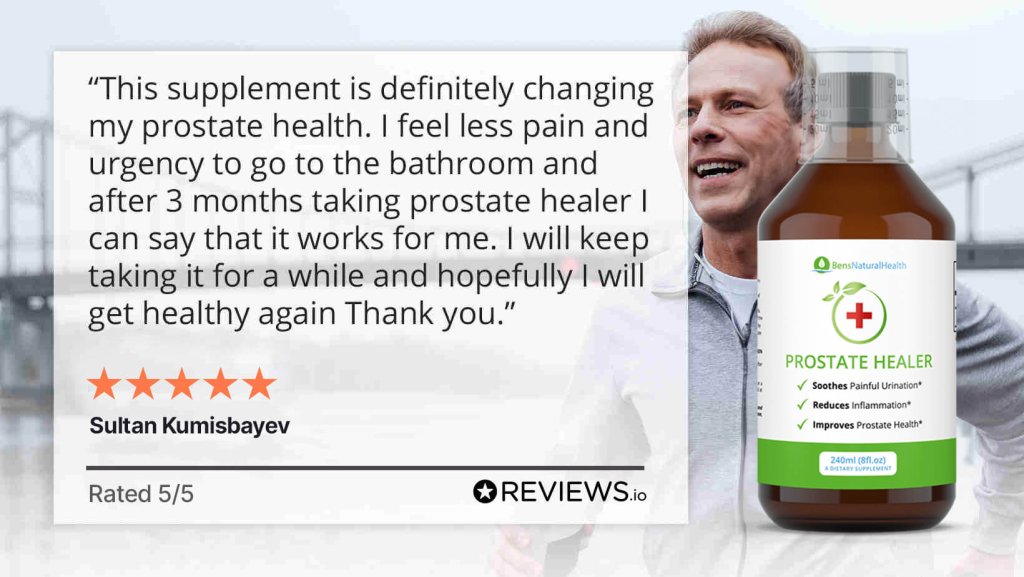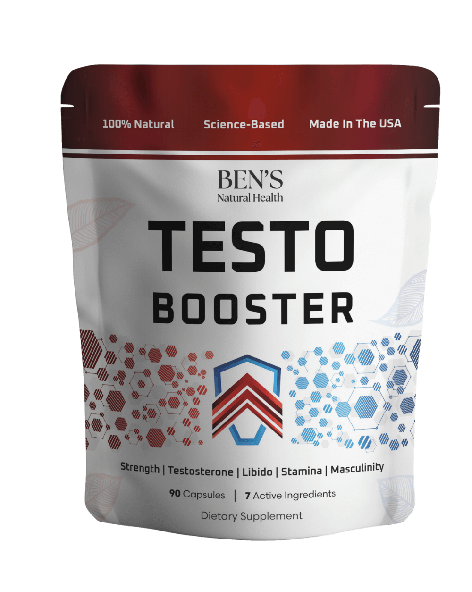- Q: Is it normal to experience a burning sensation after urinating?
- Q: What are the most common causes of burning sensation after urinating in men and women?
- Q: What is Ben’s Prostate Healer, and how does it help with bladder and prostate health?
- Q: What are some home remedies and doctor-recommended treatments to soothe the burning sensation after urinating?
- Q: How long does it typically take for the burning sensation after urinating to go away?
- Expert Q&A About Burning Sensation After Urinating
- Conclusion
- Our Medical Review Process
- Our Editorial Guidelines
- Medical Disclaimer
- Source
A burning sensation after urination does not always indicate an infection. Other possible causes include painful bladder syndrome(interstitial cystitis), urethral stricture, prostatitis, and kidney disease.
Dysuria refers to a burning or painful sensation when you pee (urinate). Men and women of any age can experience dysuria, but it’s more common in women. Urinary tract infections (UTIs) are often associated with dysuria. Treatment ranges from antibiotics to avoiding irritants to treating the underlying medical problem.
For this article, we interviewed licensed medical doctor Dr. David Lesta to provide professional insights on how to stop burning sensations after urinating. Dr. Lesta addressed direct questions concerning this symptom and its common underlying causes, such as burning after urination, and offered expert guidance for both males and females experiencing discomfort or a slight burning sensation after urination. His responses are grounded in evidence-based medicine, incorporating relevant current practices related to interventions such as home remedies and clinical treatment. Every aspect of this article has been carefully reviewed to ensure it is medically sourced and trustworthy for readers seeking reliable information on painful urination and related urinary symptoms.
Q: Is it normal to experience a burning sensation after urinating?
Dr. Lesta answers: No, it’s not normal to feel a burning sensation after urinating. When your body produces a burning or painful feeling during or after urination, it’s signaling that something isn’t right. This is a symptom referred to medically as dysuria. The burning sensation after urinating is often a warning sign of an underlying condition that requires attention. While the burning may not always indicate a serious issue, persistent symptoms warrant evaluation by a healthcare professional to identify the underlying cause and prevent complications. If the burning sensation persists after urination, consult your doctor to determine an appropriate treatment approach.
Get 10% Off Our Products!
- Sign up to our newsletter
- Get Your FREE PSA Lowering Diet Plan
- Be the first to hear about sales and promotions
- Stay up to date on our latest health news
Q: What are the most common causes of burning sensation after urinating in men and women?
Dr. Lesta answers: There are numerous reasons why you may develop a burning sensation after urinating, often described as painful urination or dysuria. Understanding burning sensation after urination is key to effective treatment and relief. Some of the most common causes include:
- Urinary tract infection (UTI): UTIs are a leading cause, triggered by bacterial infection or inflammation in the urinary system. Women are particularly at risk due to a shorter urethra, making it easier to reach the bladder. The burning during urination is a classic symptom of UTIs in both men and women. Research confirms the higher prevalence in females.
- Sexually transmitted infections (STIs): Infections like gonorrhea, genital herpes, and chlamydia can all cause burning after urination in both sexes.
- Cystitis: It refers to inflammation of the bladder lining. The most common form is interstitial cystitis, also called painful bladder syndrome, which often leads to discomfort and burning pee. You can learn more about cystitis and its impact on urination.
- Prostatitis: In men, inflammation of the prostate gland may be responsible for burning at the tip when peeing or discomfort after urination.
- Urethritis: This is inflammation of the urethra, often bacterial in origin, and can cause soreness, pain, or burning sensations during and after urination.
- Pelvic inflammatory disease (PID) in women: PID affects reproductive organs such as the ovaries, fallopian tubes, cervix, and uterus, and can result in burning urination, pain during intercourse, and ongoing discomfort after peeing.
- Epididymitis: Inflammation of the epididymis, the coiled tube at the back of the testicles, can also trigger a burning feeling after urination in men. Read more about epididymitis symptoms and management.
Other contributors include kidney stones, side effects of certain medications, and obstructive uropathy—a condition where blockages in the urinary tract cause urine to reflux. Additionally, using harsh soaps or personal hygiene products can irritate sensitive tissue and lead to a mild burning after urination, especially in females.
It’s essential not to ignore ongoing discomfort when urinating, as timely diagnosis can dramatically improve outcomes and provide effective treatment for a burning sensation after urination.
Q: What is Ben’s Prostate Healer, and how does it help with bladder and prostate health?
Dr. Lesta answers: Prostate Healer is a specially formulated supplement featuring a proprietary blend of nine potent herbs renowned for their ability to support prostate health and overall bladder function. Ben’s Prostate Healer targets prostate conditions such as prostatitis and benign prostatic hyperplasia (BPH), shields the bladder, alleviates symptoms of urinary tract infections, and reduces inflammation throughout the urinary system.
This supplement works synergistically on the prostate, kidney, and bladder, encouraging the restoration of normal cellular function and immune response. According to user testimonials, some men have reported fewer bathroom trips, reduced burning, and improved urine flow.

For men experiencing frequent or uncomfortable urination, Prostate Healer offers an integrative approach, working at the root level on bladder, prostate, and kidney health. This may result in fewer symptoms, less discomfort, and an improved quality of life. If you’re seeking ways to relieve burning after urination, mainly due to an enlarged prostate or persistent bladder irritation, this supplement may be beneficial as part of a comprehensive wellness plan. Always consult your healthcare provider before starting any new supplement, especially if you have other medical conditions or are taking medication.
Q: What are some home remedies and doctor-recommended treatments to soothe the burning sensation after urinating?
Dr. Lesta answers: Experiencing a burning micturition can be distressing, but there are several at-home and medically-backed remedies available to provide relief. Here are some practical approaches for how to stop burning sensation after urinating:
Q: Why is staying hydrated important, and how does it help with burning after urination?
Dr. Lesta answers: Hydration is crucial for flushing out bacteria and maintaining urinary tract health. Contrary to the instinct to limit fluid intake to avoid painful urination, drinking more water actually promotes the elimination of bacteria responsible for infection and inflammation. Adequate hydration helps prevent the recurrence of UTIs and reduces overall discomfort during urination. Aim for at least eight glasses of water daily; if necessary, use reminders to help you stay on track. Hydration is one of the simplest and most natural remedies for urinary burning.
Q: Can applying a warm compress help with pain and burning after urination?
Dr. Lesta answers: Applying a warm compress to the lower abdomen or pelvic area is an effective way to relieve bladder pressure and reduce the intensity of pain caused by infections or inflammation. Use a warm cloth or heating pad for about five minutes; repeat as needed. This therapy can also alleviate pelvic heaviness associated with urinary tract issues and provide soothing relief for burning sensations during urination. See tips for relieving bladder inflammation using warmth.
Q: How can vitamin C help in managing burning sensations after urinating?
Dr. Lesta answers: Vitamin C is renowned for boosting immune system strength, which is essential for battling both infection and inflammation, the frequent culprits behind burning after peeing. Increasing your dietary intake of vitamin C can fortify your body’s natural defenses and reduce ongoing inflammation. Focus on consuming citrus fruits and other vitamin C-rich produce. It’s best to get vitamin C from foods rather than supplements, as synthetic vitamin C can sometimes irritate the bladder lining and worsen symptoms.
Q: Can horseradish provide relief for burning after urination?
Dr. Lesta answers: Horseradish, a pungent root vegetable, has long-standing use in traditional medicine for combating infections. It has been documented to have antibacterial properties and may help kill bacteria associated with burning sensations after urination. Traditional remedies suggest consuming small amounts of grated horseradish mixed with milk or water, though clinical evidence on its effectiveness remains limited. Consult your doctor before trying this approach. Studies show horseradish’s effectiveness in managing bacterial issues.
Q: Are there benefits to using fenugreek seeds for burning after urination, particularly for women?
Dr. Lesta answers: Fenugreek is a plant whose seeds are rich in medicinal properties and can support urinary health, especially in females. Fenugreek can help improve vaginal pH and protect against infection, while also supporting the body in eliminating toxins. To try this remedy, add a teaspoon of fenugreek powder to a glass of buttermilk twice daily, or combine the powder with one tablespoon of raw honey and consume it two to three times a day as part of a routine aimed at alleviating urinary burning in women.
Q: How can cucumbers help alleviate burning and discomfort during urination?
Dr. Lesta answers: Cucumbers are composed of approximately 95% water, making them an excellent source for hydration and toxin removal. Their natural diuretic properties help flush out the urinary tract, which in turn decreases bacterial concentration and alleviates the burning sensation during urination. A beneficial recipe combines one cup of cucumber juice with honey and lemon, all of which have anti-inflammatory and healing properties. Try drinking this mixture twice daily, or simply enjoy 2-3 cucumbers as a snack. Details on their natural diuretic effect can be found online.

Q: What are some additional natural remedies for urinary burning?
Dr. Lesta answers: Other effective home remedies for burning urine and how to get rid of the burning sensation when you pee include:
- Drinking cranberry juice can help prevent urinary tract infections.
- Maintaining excellent personal hygiene.
- Wearing clean underwear daily to reduce bacterial contamination.
- Drinking coconut water for hydration and anti-inflammatory effects.
- Adding lemon juice to warm water with honey to support urinary cleansing.
- In some cases, a healthcare provider may recommend a baking soda and water solution to neutralize urinary acids, but this should only be done under medical supervision.
- Combining apple cider vinegar with water and honey has mild antibacterial effects.
- Incorporating blueberries and natural yogurt into your diet for their probiotic and antioxidant benefits.
These lifestyle modifications are considered key components in addressing a burning sensation after urination, offering home remedies and providing natural solutions for patients seeking relief.
Q: When should someone seek professional medical treatment for a burning sensation after urinating, and what might a doctor recommend?
Dr. Lesta answers: If burning or pain persists, becomes severe, or is accompanied by other symptoms such as fever, blood in the urine, or flank pain, it’s essential to consult a healthcare professional. For bacterial infections such as UTIs, STIs, or prostatitis, prescription antibiotics are typically required. Your doctor may also recommend anti-inflammatory medicines or medications specifically designed to calm an irritated bladder. Effective management always depends on addressing the underlying cause, whether it is an infection, inflammation, obstruction, or a chronic condition. Early diagnosis helps prevent complications such as kidney infection or severe bladder problems.
Get your FREE bladder diary
- Daily bladder diary
- Better understand your urinary symptoms
- Step-by-step guide
Q: How long does it typically take for the burning sensation after urinating to go away?
Dr. Lesta answers: The duration of a burning sensation after urination depends on the underlying cause and the chosen treatment. For example, UTIs generally respond quickly to antibiotics, with symptoms resolving within 24 to 48 hours. However, more complex conditions, such as kidney infections, might take up to a week or longer to clear.
In men diagnosed with prostatitis, symptoms may improve within two to six weeks after beginning treatment ( see details on prostatitis treatment). Interstitial cystitis and painful bladder syndrome can be particularly stubborn, sometimes requiring up to four months for noticeable improvement. As you can see, the timeline varies significantly, and being proactive by following your prescribed regimen and healthy home habits is vital for achieving relief from burning when you urinate. Consult your doctor if improvements are slow or if symptoms persist, as alternative or additional treatments may be needed for successful resolution.
Expert Q&A About Burning Sensation After Urinating
Q: Why does it burn when I pee (male-specific)?
Dr. Lesta answers: Burning during urination, or dysuria, in men is a common symptom that can indicate several different conditions. The most frequent cause is a UTI, although UTIs are less common in men than in women. Other possibilities include STIs such as chlamydia or gonorrhea, prostatitis (inflammation of the prostate gland), or an inflammation of the urethra called urethritis. In some cases, kidney stones or bladder stones, which can irritate the bladder lining and cause burning during urination.
Q: What are common reasons for slight burning after urination female?
Dr. Lesta answers: For women, a slight burning sensation after urination is most often a sign of a UTI. This happens because the urethra, which is shorter in females, is close to the rectum, making it easier for bacteria to enter the urinary system. Other potential causes include vaginal infections, such as yeast infections or bacterial vaginosis, which can irritate the urinary opening. Menopause can also lead to thinning and drying of the urethral and vaginal tissues, a condition known as genitourinary syndrome of menopause (GSM), formerly called atrophic urethritis, which can cause a burning sensation. Additionally, certain chemicals in soaps, bubble baths, or feminine hygiene sprays can cause irritation.
Q: Which medicine for burning during urination should I discuss with my doctor?
Dr. Lesta answers: The medication your doctor recommends will depend entirely on the underlying cause of the burning sensation. For a bacterial UTI, a course of antibiotics is typically prescribed. Common choices include nitrofurantoin, sulfamethoxazole-trimethoprim, or fluoroquinolones. If a STI is the cause, specific antibiotics or antiviral medications will be used. For an inflamed prostate, your doctor might prescribe a different type of antibiotic or an alpha-blocker. It is crucial to get an accurate diagnosis from your doctor before taking any medication, as using the wrong medicine can be ineffective and even harmful.
Q: How do I make it stop burning when I pee without antibiotics?
Dr. Lesta answers: While antibiotics are necessary for bacterial infections, there are times when burning can be relieved without them. If the cause is a minor irritation, increasing your water intake can help flush out the urinary tract and reduce discomfort. Over-the-counter pain relievers like ibuprofen or phenazopyridine (AZO) can help manage the pain, but they do not treat the root cause. If the burning is caused by a chemical irritant, discontinuing the use of the product (e.g., a new soap) is the best solution. Always remember that if you suspect a bacterial infection, it’s essential to see a doctor, as a delay in treatment could lead to a more serious kidney infection.
Q: What are the main differences between burning after peeing caused by infection versus non-infectious triggers?
Dr. Lesta answers: The key difference lies in the cause and accompanying symptoms. A burning sensation caused by an infection, such as a UTI, is typically accompanied by other symptoms like frequent and urgent need to urinate, cloudy or strong-smelling urine, and sometimes blood in the urine. A fever or pelvic pain can also accompany it. Non-infectious triggers, however, often lack these additional symptoms. For example, burning caused by chemical irritants might be an isolated symptom that resolves once the irritant is removed. Similarly, burning from kidney stones is often associated with severe flank or back pain, and a burning sensation due to atrophic urethritis may be accompanied by vaginal dryness and pain during intercourse.
Q: Are there preventive steps I can take to avoid a burning sensation after urination if I get frequent symptoms?
Dr. Lesta answers: Yes, several preventive measures can help reduce the frequency of symptoms. Staying well-hydrated is one of the most effective methods, as it helps to flush the urinary tract regularly. For women, it is recommended to urinate after sexual activity to help flush out any bacteria. Wiping from front to back after using the toilet can also prevent bacteria from the rectum from entering the urethra. Avoiding irritating products, such as scented soaps, douches, and feminine hygiene sprays, is also crucial. Lastly, for those with recurring issues, a healthcare provider might suggest a daily dose of a specific supplement, such as D-mannose, or a low-dose antibiotic regimen to prevent recurrent infections.
Conclusion
If you’re experiencing a burning sensation after urinating, it’s natural to feel concerned or uncomfortable, but know that you are not alone; many people face this issue at some point in their lives. The primary focus of this article is on alleviating burning sensations after urination, and there are several safe and effective methods to address this issue. Sometimes, simple steps like drinking more water, practicing gentle personal hygiene, and avoiding irritating products can make a significant difference. In some cases, temporary relief might come from warm baths or avoiding spicy foods and caffeine. It’s essential to recognize that while mild discomfort can often be managed at home, you should consult your healthcare provider if the burning sensation persists or if you notice any other changes, such as blood in your urine or a fever. Your doctor can help find out what’s causing your symptoms and suggest the best treatment for you. Remember, taking care of yourself and seeking help when something feels wrong is the first step to feeling better. You deserve comfort and peace of mind, and support is available whenever you need it.
Our Medical Review Process
At Ben’s Natural Health, we emphasize clear, accurate, and reliable health information. Each piece of content is created by qualified medical professionals and is carefully reviewed every 12 to 24 months to ensure the information remains current, well-researched, and precise. We exclusively reference reputable, peer-reviewed studies from established medical journals. Every article contains complete citations and direct links, so you can easily check the reliability of our resources. Learn more about our standards and procedures on our Medical Review Process page.
Our Editorial Guidelines
With a history spanning 25 years, Ben’s Natural Health is dedicated to delivering high-quality, scientifically grounded natural health content. Our strict editorial standards guarantee the reliability of our information. Articles are authored by certified experts, including doctors, nutritionists, registered dietitians, surgeons, and certified fitness professionals, and every piece undergoes independent review. Author credentials, expertise, and biographies are openly shared and accessible at the beginning of each article. To see exactly how we develop and review our content, visit our detailed editorial guidelines.
Medical Disclaimer
The information found on this blog is intended solely for general knowledge and should never be considered a replacement for medical advice, diagnosis, or treatment from a qualified professional. Although our materials are authored by a licensed physician and medically reviewed, the content does not constitute personalized medical advice. Always consult your healthcare provider or physician for advice specific to your health situation. Never ignore or postpone seeking medical guidance because of something you have read here. Any decisions you make based on the content of this blog are solely your responsibility.
Explore More










